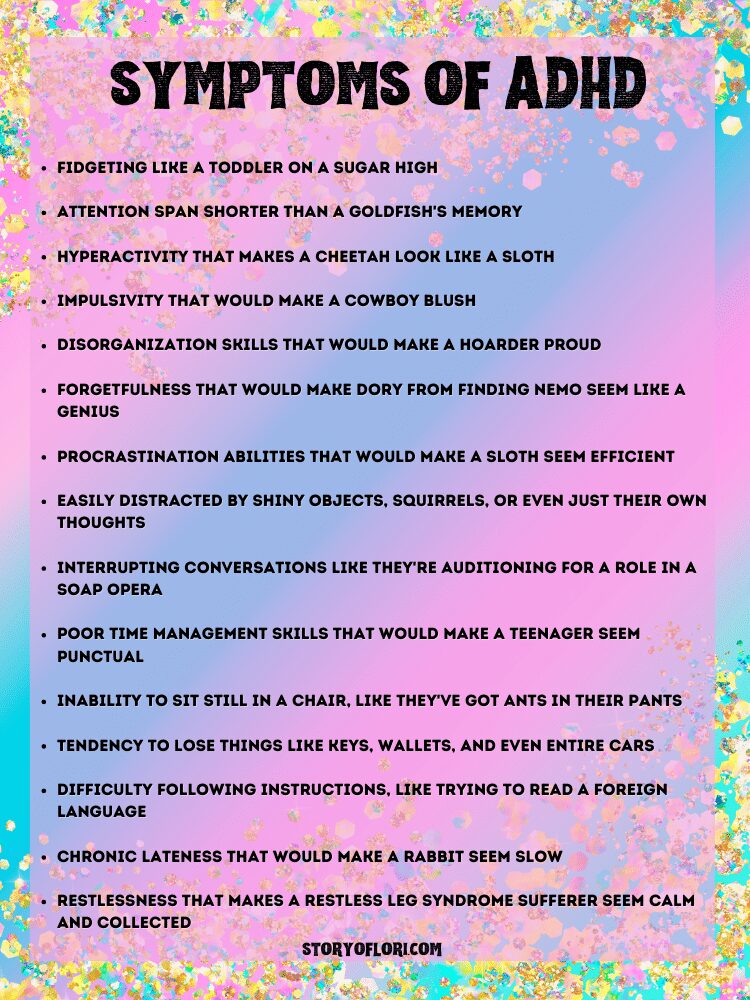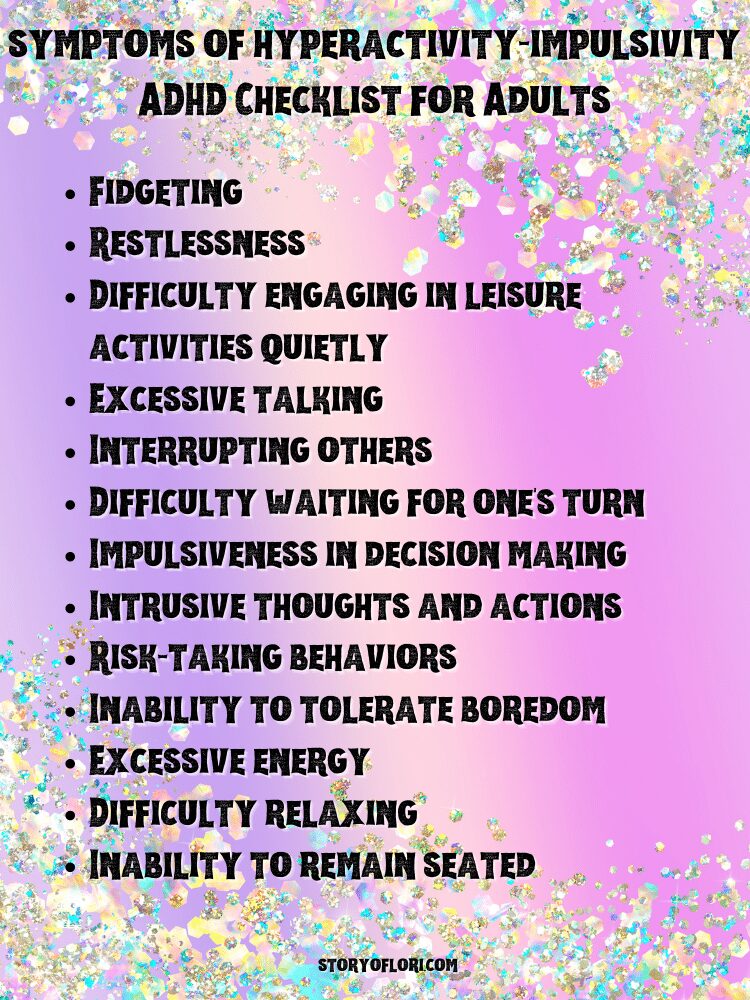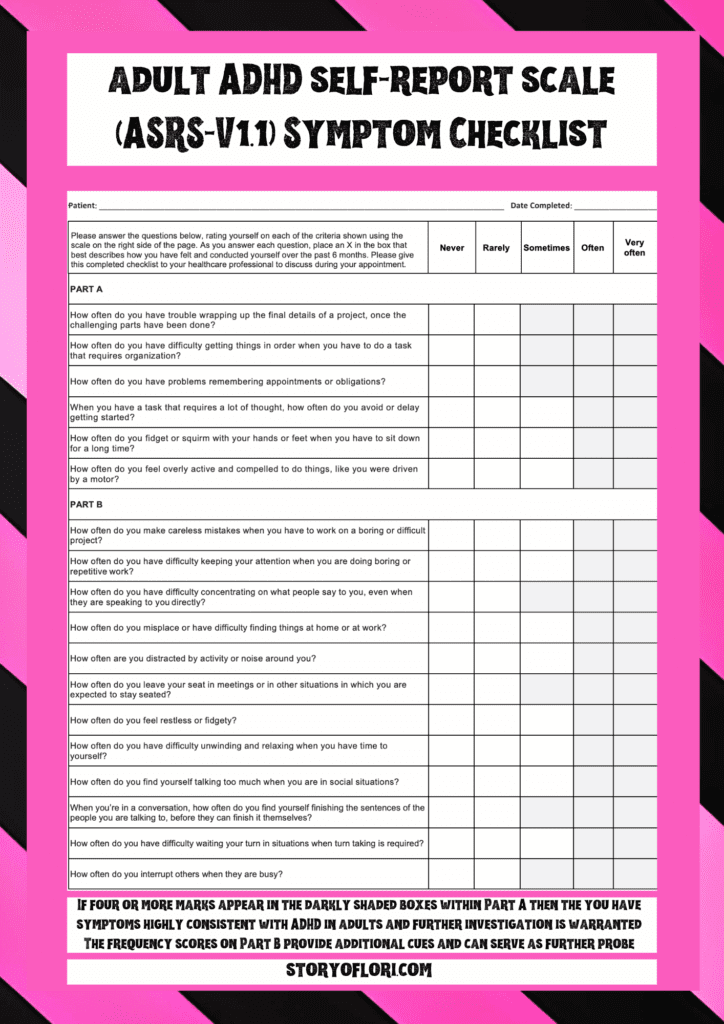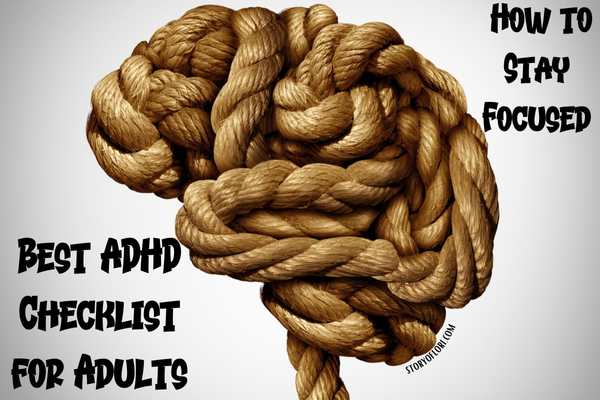Best ADHD Checklist for Adults: How to for potential ADHDers
I may earn money or products from the companies mentioned, at no extra cost to you. I only support what I know and love!
Struggling to stay focused and organized? Fear not, there’s hope! Let me introduce you to the Best ADHD Checklist for Adults: How to for potential ADHDers – designed to help you manage your symptoms and stay on track. Whether you’ve been diagnosed with ADHD or suspect you may have it, this comprehensive checklist, along with tips for staying focused, will help you navigate your daily life with greater ease and success.
What is Attention Deficit Hyperactivity Disorder (ADHD)?
So, before we talk about the ADHD checklist for adults, lets discuss attention deficit hyperactivity disorder (ADHD) and what it is. Well, let me tell you, it’s a real hoot. One minute you’re completely focused on a task and the next minute, ooh shiny! What was I saying again?
But in all seriousness, ADHD is a neurodevelopmental disorder that affects both children and adults. It’s characterized by symptoms such as:
- Inattention
- Hyperactivity
- Impulsivity
Diagnosis of ADHD can be a bit tricky, which is why I will introduce the ADHD checklist for adults in a bit. There are other medical conditions and learning disabilities that can mimic the symptoms that makes diagnosis tough. Plus, there are some common misconceptions about ADHD that can make it difficult to recognize in yourself or others.
But don’t worry, there are self-assessment tools along with the ADHD checklist for adults that can help you figure out if you or someone you know may have ADHD. And if you do have ADHD, there are treatments available to help you manage your symptoms and improve your daily life.
Just remember, having ADHD doesn’t mean you’re broken or less capable than others. In fact, some of the most successful people in history have had ADHD, like Richard Branson and Simone Biles. So embrace your quirkiness and keep on keepin’ on!
What are the symptoms listed on an ADHD Checklist for Adults?
Today we’ll dive into the exciting world of ADHD symptoms and what they are assessing for on an ADHD checklist for adults. Get ready for a wild ride of hyperactivity, impulsivity, and…wait, what was I saying again? Oh yeah, symptoms! There is a broad range of symptoms of adult ADHD so Let’s get started. The following ADHD symptoms are the most common ones, so not everyone will have every symptom and there are more than this list contains. List of symptoms:
- Inattention: You know that feeling when you’re watching a movie and your mind starts to wander? Yeah, that’s inattention. And with ADHD, it can happen all the time, even during important tasks like work or school.
- Hyperactivity: Do you ever feel like you’re buzzing with energy and can’t sit still? That’s hyperactivity, baby! People with ADHD can have a hard time staying still or focusing on one thing for too long.
- Impulsivity: You know when you have an impulse to buy that cute shirt even though you really don’t need it? Yeah, that’s impulsivity. And with ADHD, it can lead to making impulsive decisions without thinking them through.
- Forgetfulness: Wait, what was I saying again? Oh yeah, forgetfulness. People with ADHD can have a hard time remembering important dates or details, which can be frustrating for them and those around them.
- Difficulty completing tasks: You know when you start a project and then get distracted by something else? Yeah, people with ADHD do that all the time. It can be tough to stay on task and complete projects or assignments.
- Disorganization: Ever feel like your life is a mess? That’s nothing compared to the disorganization that can come with ADHD. People with ADHD can struggle with keeping their space and their life organized.
- Fidgeting: You know when you tap your foot or play with your hair? Yeah, people with ADHD do that too, but all the time. Fidgeting can be a way for people with ADHD to release their extra energy.
- Difficulty with time management: People with ADHD can struggle with managing their time effectively, which can lead to missed appointments or deadlines.
- Impatience: You know when you’re waiting for your food to heat up in the microwave and it feels like an eternity? Yeah, people with ADHD can have a hard time being patient, which can lead to frustration and impulsivity.
- Careless mistakes: Do you want to know how many times I knocked over my cans of Mountain Dew? Yeah, I lost count and finally graduated to bottles, then a latched water bottle.
And there you have it! A comprehensive list of ADHD symptoms with a fun and quirky twist. Remember, having ADHD can be tough, but it doesn’t define who you are as a person. Keep on shining, you beautiful ball of energy!

What are the subtypes of ADHD and how do they differ?
Well, dear friend, I’m glad you asked! There are three subtypes of ADHD that are looked at in the ADHD checklist for adults, each with its own unique set of quirks and eccentricities:
- Inattentive type: Think of this as ADHD-lite, with a side of daydreaming. People with this subtype are easily distracted, forgetful, and tend to get lost in their own thoughts. They’re like a puppy who keeps getting sidetracked by butterflies.
- Hyperactive-impulsive type: This is like regular ADHD, but with a triple shot of espresso. People with this subtype are constantly on the move, can’t sit still, and have a tendency to interrupt conversations like a toddler at a dinner party. They’re like a hummingbird on steroids.
- Combined type: This is like ADHD on steroids, with a shot of Red Bull. People with this subtype have all the symptoms of inattentive and hyperactive-impulsive types combined. They’re like a Tasmanian devil in human form.
So there you have it, folks. Three subtypes of ADHD that the ADHD checklist for adults points at, each with its own unique brand of chaos and mayhem. Good luck trying to keep up with them!
symptoms of hyperactivity-impulsivity that indicate a need for the ADHD Checklist for Adults
Buckle up and hold on tight! As we explore the symptoms of hyperactivity-impulsivity ADHD Checklist for Adults, we’ll also take a closer look at those executive functions that ADHD brains have trouble with that frustrates us ADHDers. So let’s get started, and try not to break anything along the way! Let’s mosey to the symptoms of hyperactivity-impulsivity that indicate a need for the ADHD Checklist for Adults that I keep mentioning:
- Fidgeting, restlessness, and feeling the need to stay constantly active
- Difficulty sitting still and staying focused on tasks that require sustained mental effort
- Difficulty engaging in quiet activities, such as reading or working in a quiet environment
- Acting impulsively without thinking about the consequences, such as making rash decisions or interrupting others during conversations
- Difficulty waiting for one’s turn, such as in group settings or during games
- Tendency to speak before thinking, leading to saying inappropriate things or interrupting others
- Inability to resist temptation, leading to engaging in risky behaviors such as substance use or gambling
- Difficulty with time management, resulting in lateness or missed deadlines
- Difficulty completing tasks, leading to procrastination and unfinished projects
- Impaired social interaction skills, such as difficulty maintaining personal relationships and frequent conflicts with others
So, do you think you need that ADHD checklist for adults? Coming right up!

symptoms of inattentive type that indicate a need for the ADHD Checklist for Adults
Do you often find yourself struggling with things, even when you try your best? Do you frequently get lost in thought? These are just a few common symptoms of inattentive type ADHD that indicates a need for indicate a need for the ADHD checklist for adults. Here is a list of symptoms of inattention:
- Difficulty paying attention to details or making careless mistakes
- Trouble staying focused on tasks or activities
- Difficulty listening when spoken to directly
- Forgetfulness and absent-mindedness
- Trouble with organization and planning
- Avoidance of tasks that require sustained mental effort
- Tendency to lose things necessary for daily activities
- Easily distracted by external stimuli
- Difficulty following through on instructions or completing tasks
- Forgetful in daily activities
How is ADHD diagnosed besides the ADHD checklist for adults?
Well, if you think you have ADHD, the first step is to Google it and read a bunch of articles on the internet. Then, you can self-diagnose based on which symptoms you think you have and with the ADHD checklist for adults, but if you want a more official diagnosis, you’ll need to see a healthcare professional who will evaluate your symptoms based on standardized criteria from the DSM-5 (Diagnostic and Statistical Manual of Mental Disorders, 5th edition). They might also use other tests to rule out other conditions or medical issues that could be causing your symptoms. But hey, who needs a doctor when you have the internet, am I right?
Assessment of Adult ADHD: Clinical Interview and Rating Scales
What medical conditions and learning disabilities can mimic ADHD symptoms?
There are several medical conditions and the occasional learning disability that can mimic ADHD symptoms, making it difficult to accurately diagnose the disorder. The ADHD checklist for adults can help rule these in or out. Some of these conditions include:
- Sleep disorders
- Anxiety disorders
- Depression
- Hearing or vision problems
- Learning disabilities, such as dyslexia or dyscalculia
- Autism spectrum disorder
- Sensory processing disorder
- Thyroid problems
- Fetal alcohol syndrome
- Traumatic brain injury
What is the appropriate treatment for ADHD?
The appropriate treatment for ADHD typically involves a combination of medication and behavioral therapy, but the ADHD checklist for adults can help determine that too, based on your answers. Stimulant medications such as Ritalin and Adderall are commonly prescribed to help manage symptoms, along with non-stimulant medications like Strattera.
Behavioral therapy can include counseling, cognitive behavioral therapy, and coaching to develop coping strategies and improve time management and organizational skills. Personally, I partake in the Ritalin roller coaster. It keeps my attention in a better place – sometimes too much – but I sometimes have more ups-and-downs during the day.
What are the significant challenges faced in adult life that indicate a need for the ADHD Checklist for Adults?
Having ADHD can be a wild ride, right? Trust me, it can. Sometimes it feels like you’re on a never-ending rollercoaster of distraction and impulsivity. But, let’s face it, it also makes life more interesting. Who needs boring old focus and organization anyway? Where do I begin? Let’s see… we have a laundry list of challenges that the ADHD checklist for adults looks at, including:
- Constantly losing things (keys, phone, wallet, sanity…)
- Procrastination (I’ll start working on this list tomorrow)
- Poor time management (wait, what day is it again?)
- Difficulty focusing (ooh, squirrel!)
- Impulsive behavior (do I really need this third cupcake?)
- Short-term memory problems (what was I saying?)
- Trouble completing tasks (I’ll just leave this project half-finished…)
- Struggles with organization (where did I put that important document again?)
- Trouble with personal relationships (sorry, I forgot our anniversary)
- Self-esteem issues (why can’t I be more like that perfectly put-together person over there?)
All of these challenges are addressed in the ADHD checklist for adults, but trying to overcome the challenges of ADHD can sometimes feel like trying to untangle a ball of yarn while blindfolded – it’s a messy, frustrating process, but with patience and persistence, the knots can be undone.
Understanding the ADHD Checklist for Adults and Self-Assessment Tools
Attention deficit hyperactivity disorder, or ADHD, is not just an excuse for being scatterbrained or easily distracted. No, it’s a legitimate diagnosis that affects millions of people worldwide. And for those who suspect they may have ADHD, or just want to check it out for fun, there are plenty of self-assessment tools and checklists available. So, grab your pen and paper, take a deep breath, and get ready to dive into the world of an ADHD symptom checklist for adults as a self-assessment tool. If you are taking it for sh*ts and giggles – as I know some of you are – I hope you don’t get a nasty surprise!
What is the Adult ADHD Self-Report Scale (ASRS) and how does it work?
The Adult ADHD Self-Report Scale (ASRS) – it’s like a Buzzfeed quiz, but instead of finding out which Disney princess you are, you get diagnosed with a lifelong condition. The ASRS is a standardized assessment tool used to determine the likelihood of an individual having ADHD. It consists of 18 questions that ask about symptoms of inattention and hyperactivity-impulsivity.
Just like a Buzzfeed quiz, you answer the questions and the ASRS spits out a score that tells you whether or not you have ADHD. So, if you’re tired of taking personality quizzes and want to get to the bottom of your attention issues, give the ADHD checklist for adults, or adult self-report scale symptom checklist (ASRS) a try!

What is included in Part A and Part B of the symptom checklist?
Part A and Part B of the ADHD symptom checklist, you say? Let me tell you, they’re the two best parts of the whole dang thing! Part A is where you get to rate your own level of inattention and hyperactivity-impulsivity, while Part B is all about those pesky symptoms and how often they bother you.
Part A is the part that you are scored on. If you click on the free download of the ADHD Checklist for Adults above, you will get the scoring included in the notes.. So, it’s like a choose-your-own-adventure book, but instead of battling dragons, you’re battling ADHD symptoms. Exciting stuff, am I right?
How do self-assessment tools help with an accurate ADHD diagnosis?
ADHD. The disorder that everyone thinks they know all about, but really has no clue. Let’s debunk some of the common myths and misconceptions, shall we?
Well, dear ADHD-diagnosed friend, self-assessment tools can be a useful first step in the diagnostic process. They can help you identify and track your symptoms over time, and give your doctor or mental health professional a better understanding of your experiences. Plus, who doesn’t love taking online quizzes?
You get to find out what type you have! Just don’t forget that self-assessment tools are not a substitute for a thorough evaluation by a trained professional. So, if you’re relying solely on a “What Type of Attention Deficit Are You?” ADHD symptom test, maybe you should reconsider.
What are some common myths & misconceptions about ADHD?
- Myth: ADHD isn’t a real disorder. It’s just an excuse for lazy, undisciplined people.
- Myth: Only kids can have ADHD. Adults just need to suck it up and focus.
- Myth: ADHD is caused by bad parenting or too much screen time.
- Myth: Medication is a cure-all for ADHD. Just pop a pill and you’ll be cured!
- Myth: People with ADHD are all hyper and bouncing off the walls.
- Myth: ADHD is just a fancy term for being scatterbrained or forgetful.
- Myth: People with ADHD can’t be successful in life or have fulfilling relationships.
Phew, that was exhausting. Let’s set the record straight, folks. Please pin this to let Pinterest know that it is important. How, you ask? The more people that pin it, the more Pinterest shares it to other people looking for ADHD information.
What are some other mental health and personality disorders that have similar symptoms to ADHD?
You want to know about some other disorders that might be mistaken for ADHD, huh? Well, let me tell you, there are plenty! You’ve got depression, panic, mania,, and even good old-fashioned laziness. So, next time you’re feeling like you can’t focus, just remember, it could be any of these things:
- Oppositional Defiant Disorder (ODD)
- Anxiety Disorder
- Bipolar Disorder
- Obsessive-Compulsive Disorder (OCD)
- Sleep Disorders
- Antisocial Personality Disorder (APD)
- Conduct Disorder
- borderline personality disorder
All of these conditions can share symptoms with ADHD, such as impulsivity, inattention, and hyperactivity. The ADHD Checklist for Adults helps to differentiate between them. However, it is essential to differentiate between them to provide proper treatment. A professional assessment is crucial to determining the correct diagnosis.
Is there an increase in substance use disorders with adult ADHD?
We have a match made in heaven – ADHD and substance use disorders! It’s like they were meant to be together. In all seriousness, studies have shown that adults with ADHD are more likely to develop substance use disorders compared to their neurotypical counterparts. But hey, at least they have something to blame for their bad decisions, right?
Really, though, I struggled with substance abuse for so long. I am a recovering opiate addict and am coming up on 4 years since I have touched a narcotic, although I am in a medication assistance therapy to stay off, which some don’t consider clean, but I am finally living a full life and working full-time (and then some!) on this blog, which I never would have been able to do before. I am incredibly proud of myself and I LOVE MYSELF!
How is social interaction and social life for adults with ADHD?
It’s Kinda like trying to herd cats on a trampoline! Adults with ADHD often struggle with social cues and impulsivity, making for some interesting social situations. You never know what you’re going to get with someone who has ADHD – will they interrupt you mid-sentence or forget what they were saying altogether? On the bright side, they can be a barrel of laughs and great to have around for a good time. Just don’t count on them to remember the details of the plans you made or to show up on time.
Are there any support groups or communities for adults with ADHD?
Yes, there are several support groups and communities available online for adults with ADHD. Here are three websites with URLs and three support groups available online:
Websites:
- CHADD (Children and Adults with Attention-Deficit/Hyperactivity Disorder)
- ADDitude
- TotallyADD
Support Groups:
- ADHD Online
- Reddit ADHD Support Group
- ADDA (Attention Deficit Disorder Association) Virtual Peer Support Groups
How is ADHD Diagnosed? A Guide to ADHD Testing and Evaluations | Dr. Jared DeFife
Conclusion of ADHD Checklist for Adults
In conclusion, if you’re an adult struggling with symptoms of ADHD, don’t fret! You’re not alone in your forgetfulness, impulsivity, and general chaos. With the help of checklists and self-assessment tools, you can gain a better understanding of your symptoms and take steps to manage them. And who knows, maybe your quirks will even make you the life of the party (or at least the most interesting person in the waiting room at the doctor’s office). So embrace your ADHD, embrace the checklists, and embrace the endless possibilities of life with a brain that works a little differently.
Want more about ADHD? Read 17 Unbelievable ADHD Vs. Autism Myths: From Hyperactivity To Social Communication because they are fun and good to know; and The Ultimate Guide to 27 Gifts for People with ADHD because what is better than knowing your gift will be wanted and used?
FAQ’s
What are executive functions?
Executive functions are the CEOs of our brains! These bad boys are responsible for our ability to plan, organize, prioritize, and make decisions. Basically, they’re the boss of our cognitive processes. Without them, we’d be lost in a sea of indecisiveness and chaos. Think of them as the “adulting” part of our brain.
What are behavior rating scales?
Nothing like being reduced to a series of numbers and checkboxes, am I right? But alas, that’s what behavior rating scales are all about. They’re tools that allow clinicians and parents to rate a person’s behavior based on predetermined criteria. And of course, what could be more fun than being judged by a bunch of checkboxes and arbitrary numbers? Sign me up!
is the ADHD Checklist for Adults a behavior rating scale?
Well, my dear friend, that’s quite the question. It depends on who you ask. Some people might say that the ADHD Checklist for Adults is indeed a type of behavior rating scale, while others might argue that it’s more of a self-assessment tool. But hey, why not call it both? It’s like having your cake and eating it too!
Does sustained mental effort affect ADHD?
Well, I don’t know about you, but sustained mental effort makes me want to take a nap. But to answer your question, yes, sustained mental effort can be particularly challenging for those with ADHD. It’s like trying to hold a conversation with the ‘ooh squirrel!’ while it’s simultaneously trying to climb a tree and collect nuts. The brain just wants to go in a million different directions, and sustained focus can be a real struggle due to that F-ing squirrel…
Are there any lifestyle changes I can make to manage my ADHD symptoms?
First off, you should start by adopting a healthy lifestyle. You know, exercise, eating right, getting enough sleep, blah, blah, blah. We all know that’s easier said than done, but hey, it’s a start.
Secondly, you should try to reduce your stress levels. Yeah, I know, easier said than done. Maybe just scream into a pillow for a few minutes every day (it helps). Whatever works for you.
Finally, and most importantly, you should try to stay organized. I know, I know, organization and ADHD don’t exactly go hand in hand. But trust me, it’ll make your life a lot easier. If I can do it, then ANYBODY can.
Where can you find a free download of ADHD checklists and symptom tests?
I’m glad you asked! Right up above, below the photo of the rating scale, which is what you will get, or just click the link for the ADHD Checklist for Adults
#StoryofLori






